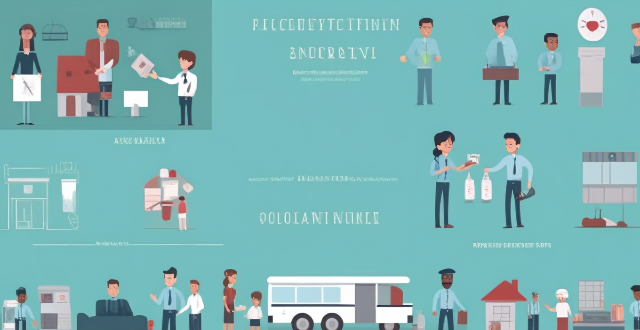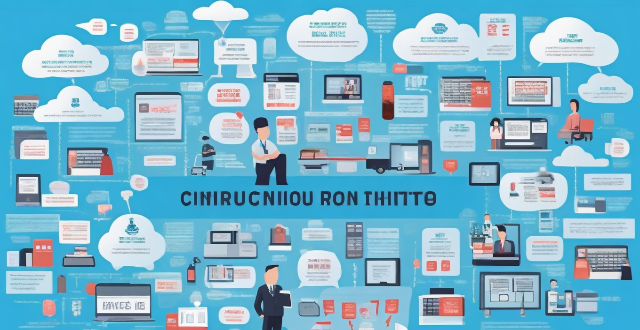Policies Society

How do inclusive policies benefit society as a whole ?
Inclusive policies are designed to promote equality, fairness, and social cohesion by eliminating barriers and discrimination. These policies benefit society as a whole by ensuring equal access to resources, services, and opportunities for all individuals regardless of their background, abilities, or circumstances. In addition to promoting equality and fairness, inclusive policies also enhance social cohesion by fostering a sense of belonging and mutual respect among different groups within society. This leads to reduced discrimination, increased tolerance, and strengthened community bonds. Inclusive policies also have positive economic outcomes by expanding the talent pool, reducing poverty, and stimulating consumer spending. Furthermore, these policies foster innovation and creativity by providing diverse perspectives, encouraging risk-taking, and promoting collaboration. Finally, inclusive policies can enhance a country's global competitiveness by attracting talent, improving international relations, and driving economic growth.

How can we promote diversity and inclusion in a multicultural society ?
This topic discusses strategies to promote diversity and inclusion in a multicultural society, including education, legislation, community engagement, media representation, business leadership, and personal actions.

How can we celebrate and embrace cultural differences in a multicultural society ?
In a multicultural society, celebrating and embracing cultural differences is crucial for fostering understanding, respect, and harmony. To achieve this, it's important to educate oneself and others about different cultures, participate in cultural events, promote diversity in media and entertainment, advocate for inclusivity in education and workplaces, engage in open dialogue, practice empathy and active listening. These strategies can help create a more inclusive and harmonious multicultural society where everyone feels valued and respected for their unique cultural contributions.

In what ways do inclusive policies contribute to economic growth and development ?
Inclusive policies are crucial for economic growth as they ensure benefits reach all societal segments. Key contributions include increased access to education, improved health outcomes, enhanced labor market participation, promotion of social cohesion, stimulation of domestic consumption, and attraction of foreign investment. These policies create a virtuous cycle benefiting both the economy and society's well-being.

What are the positive effects of celebrity influence on society ?
Celebrities wield significant influence that extends beyond their areas of expertise, and this influence can have both positive and negative impacts on society. The positive effects include raising awareness on important issues, promoting education, cultural exchange, economic growth, sustainable living, fashion trends, and driving social change through activism. Celebrities can use their platforms to bring attention to global concerns, promote healthy lifestyles, encourage mental health discussions, support literacy programs, inspire STEM pursuits, showcase cultural diversity, boost local businesses, foster entrepreneurship, advocate for eco-friendly practices, diversify beauty standards, engage in political conversations, and strengthen community bonds. However, with great influence comes great responsibility; celebrities should strive to use their platform thoughtfully and constructively for the betterment of society.

What are the advantages and disadvantages of living in a multicultural society ?
Advantages and Disadvantages of Living in a Multicultural Society The advantages of living in a multicultural society include cultural diversity, enhanced understanding and tolerance, economic benefits, language learning, and social inclusivity. These benefits enrich daily life by exposing individuals to different ways of thinking, art forms, cuisines, and festivals, fostering greater understanding and acceptance of others, attracting a skilled global workforce, providing natural opportunities to learn new languages, and promoting better access to education, healthcare, and other social services for all members of the community. However, living in a multicultural society also has its disadvantages, such as cultural conflict, integration challenges, identity confusion, potential for segregation, and policy challenges. Differences in cultural values and norms can sometimes lead to misunderstandings and conflicts, newcomers might face challenges integrating into the mainstream culture, individuals may struggle with their sense of identity, communities might form based on shared ethnicity or language reducing interaction between different groups, and managing a multicultural society requires complex policy-making to address the needs of diverse populations. Overall, living in a multicultural society requires thoughtful management and open-mindedness to navigate the complexities of diverse populations successfully while enjoying the benefits it brings.

How do immigration policies impact the social integration of immigrants ?
The text discusses the impact of immigration policies on social integration, highlighting factors such as access to basic services, employment opportunities, language proficiency, cultural sensitivity, family reunification, and legal status. It argues that policies promoting these aspects can facilitate better integration of immigrants into society, creating a more inclusive environment where they feel valued and respected.

What are the long-term effects of poor immigrant integration on society ?
This article discusses the long-term effects of poor immigrant integration on society, including social exclusion, economic consequences, and cultural impacts such as loss of cultural heritage and increased tensions between ethnic groups. It emphasizes the importance of prioritizing immigrant integration efforts to ensure that immigrants are fully included in all aspects of society.

What role do international organizations play in promoting environmental subsidy policies ?
International organizations play a crucial role in promoting environmental subsidy policies by providing information, facilitating cooperation, offering financial support, setting standards, and engaging in advocacy efforts.

How does a multicultural society impact the education system ?
In a multicultural society, the education system is influenced in various ways. One of the most obvious impacts is diversity in classrooms which can enrich the learning environment and help students develop empathy and understanding for people who are different from themselves. The curriculum may need to be adapted or changed to accommodate the needs of a diverse student population. Language barriers can also be a challenge for both students and teachers. Educators need to be culturally sensitive and aware of the diverse backgrounds of their students. Parental involvement in education can be complex in a multicultural society. By embracing diversity in the classroom, the education system can create an inclusive and enriching learning environment for all students.

What are the benefits of implementing circular economy policies ?
Implementing circular economy policies brings environmental, economic, and social benefits. Environmentally, it reduces resource consumption, lowers greenhouse gas emissions, and improves waste management. Economically, it creates jobs, saves costs, and drives innovation. Socially, it ensures resource security, improves public health, and empowers consumers. Overall, adopting these policies shifts towards a sustainable system that prioritizes long-term planetary health.

What role do governments play in promoting cultural understanding and acceptance in a multicultural society ?
Governments can promote cultural understanding and acceptance in multicultural societies by implementing policies and programs that foster diversity, inclusion, and respect for different cultures. They can launch education and awareness campaigns, enact legislation and policies, engage with communities and partner with NGOs, and promote international cooperation to create an environment where diversity is celebrated, respected, and embraced.

How do climate change negotiations influence national environmental policies ?
The influence of climate change negotiations on national environmental policies is significant, as they set international targets and promote technology transfer, financial support mechanisms, adaptation measures, stronger legal frameworks, and public awareness. These discussions help countries develop comprehensive policies that integrate climate considerations across various sectors, ensuring policy coherence and effective action towards global climate goals.

What impact do inclusive policies have on minority groups and marginalized communities ?
Inclusive policies have a significant impact on minority groups and marginalized communities, promoting equality, diversity, and fairness in society. These policies improve access to education and employment opportunities, increase representation in government and decision-making processes, reduce discrimination and harassment, and improve health outcomes for these communities. Overall, inclusive policies help ensure that all individuals have equal opportunities to participate in all aspects of life.

What are some successful examples of circular economy policies ?
The circular economy is a sustainable economic model that aims to minimize waste and pollution by keeping resources in use for as long as possible. Successful examples of circular economy policies include the European Union's Circular Economy Package, Netherlands' National Circular Economy Programme, China's Circular Economy Promotion Law, Japan's Sound Material-Cycle Society Act, and state-level initiatives in the United States. These policies focus on waste reduction, resource efficiency, extended producer responsibility, product stewardship, and public-private partnerships to promote a more sustainable future.

How does physical activity impact public health policies ?
The text discusses the importance of physical activity in promoting individual and public health. It outlines how regular exercise can prevent chronic diseases, improve mental health, and aid in weight management. The text then explains how these benefits influence public health policies, including the development of programs promoting physical activity, funding for research, and public awareness campaigns. Overall, it emphasizes the need for governments to promote physical activity through various initiatives, aiming to create a society where being active is a way of life.

What role do governments play in implementing climate policies ?
Governments play a pivotal role in implementing climate policies by setting regulations, offering financial incentives, raising public awareness, cooperating internationally, and planning infrastructure to combat climate change.

What are the long-term consequences of open versus closed immigration policies ?
Open immigration policies can lead to economic growth, culturalOpen immigration policies can lead to economic growth, cultural such as population growth and a cultural diversity, and demographic changes such as population growth and a younger age structure. Closed immigration policies may result in labor shortages, slower economic growth, and an aging population but can also maintain social homogeneity and potentially reduce cultural exchange.

How do circular economy policies promote sustainability ?
Circular economy policies promote sustainability by reducing resource consumption, minimizing waste and pollution, fostering economic growth within ecological limits, creating social benefits and jobs, and encouraging systemic change and collaboration. Key practices include promoting product longevity, eco-design, zero-waste initiatives, clean technologies, circular business models, green jobs training, and multi-stakeholder cooperation. These policies aim to transition towards a more sustainable future by keeping resources in use for as long as possible while incurring the least waste.

What are the benefits of social inclusion for individuals and society as a whole ?
Social inclusion benefits individuals and society by promoting equality, diversity, and participation. Individuals experience enhanced quality of life, greater opportunities, improved mental health, increased self-esteem, and strengthened social support networks. Society benefits from economic growth, reduced poverty and inequality, improved public services, enhanced social cohesion, increased civic engagement, promotion of human rights, a positive global image, and intergenerational equity.

In what ways do immigration policies affect the cultural diversity of a country ?
Immigration policies play a significant role in shaping the cultural diversity of a country. Policies that promote multiculturalism, facilitate family reunification, and provide opportunities for legal migration can enhance cultural diversity. In contrast, strict immigration controls, deportation policies, and anti-immigrant sentiments can hinder it.

Can you provide examples of successful inclusive policies from around the world ?
Inclusive policies are designed to ensure equal opportunities for all individuals, regardless of their background or circumstances. Examples of successful inclusive policies from around the world include the Disability Rights Act in the United States, which protects the rights of individuals with disabilities; Iceland's Gender Equality Act, aimed at achieving full gender equality; India's National Rural Health Mission, a large-scale public health initiative to provide essential healthcare services to rural populations; and Canada's Affordable Housing Program, aimed at creating more affordable housing options for low-income households. These policies demonstrate the importance of addressing social inequalities and promoting inclusivity in various areas of society.

How can inclusive policies help bridge the gap between socioeconomic classes ?
Inclusive policies can help bridge the gap between socioeconomic classes by addressing systemic inequalities and providing equal opportunities for all individuals. These policies include access to quality education, financial aid, fair hiring practices, job training programs, universal healthcare, community health programs, affordable housing, rent control policies, progressive taxation, tax credits, food assistance programs, and childcare assistance. By implementing these policies across various sectors, governments can create a more equitable society where individuals from all socioeconomic backgrounds have equal opportunities to succeed.

How do environmental subsidy policies affect sustainable development ?
This topic summary discusses the impact of environmental subsidy policies on sustainable development. These policies aim to promote renewable energy, reduce pollution, conserve natural resources, and promote eco-friendly technologies through financial incentives provided by governments. However, challenges such as limited funding, inefficient allocation of funds, and unintended consequences can hinder their effectiveness. To maximize their impact, it is crucial to ensure efficient allocation of funds and consider the broader impact of these policies.

How do public health policies encourage individuals to engage in regular physical activity ?
Public health policies play a crucial role in promoting regular physical activity among individuals. They create awareness about its benefits, provide accessible facilities, offer incentives and subsidies, and integrate physical education into school programs. These efforts improve individual health and contribute to the overall well-being of society.

What are some common challenges faced during the implementation of climate policies, and how can they be addressed ?
Implementing climate policies faces challenges in political will, economic concerns, social acceptance, and technical limitations. Addressing these requires stakeholder engagement, policy coherence, innovation, and international cooperation.

In what ways does education empower women socially and politically ?
Education is crucial for women's empowerment, enabling them to challenge societal norms and contribute more fully to society. It fosters increased awareness, improved socioeconomic status, and enhanced social relationships. Education also leads to greater political participation, policy influence, and promotion of gender equality. Overall, education enriches society by improving the lives of women and contributing to a more equitable world.

What challenges do countries face in implementing circular economy policies ?
Implementing circular economy policies is a complex process that countries face numerous challenges. These include lack of awareness and understanding, economic and industrial structure, legal and regulatory framework, market conditions and business practices, as well as social and cultural factors. Addressing these challenges is crucial for the successful implementation of circular economy policies, which can bring significant environmental and socioeconomic benefits.

What policies have countries implemented to ensure equal access to education for both sexes ?
Policies for Equal Education Access: Key Policies and Challenges

How do immigration policies affect the demographics of a country ?
Immigration policies significantly impact a country's demographics, including population size, age distribution, ethnic composition, and socio-economic characteristics. Open borders can lead to population growth and younger demographics, while restrictive policies may result in slower growth or aging populations. Ethnic diversity is influenced by the selection of immigrants based on nationality or skill set. Socio-economic attributes are shaped by the educational background and employment opportunities for immigrants, affecting labor markets and economic performance. Countries like the U.S., Canada, and Australia have seen positive demographic shifts due to their immigration policies, while others like Japan and Hungary face challenges related to population dynamics and diversity.